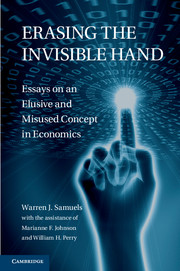Book contents
- Frontmatter
- Contents
- Acknowledgments
- Preface
- 1 Adam Smith’s Invisible Hand and the Nobel Prize in Economic Sciences
- 2 The Political Economy of Adam Smith
- 3 On the Identities and Functions of the Invisible Hand
- 4 Adam Smith's History of Astronomy Argument
- 5 The Invisible Hand, Decision Making, and Working Things Out
- 6 The Invisible Hand in an Uncertain World with an Uncertain Language
- 7 The Invisible Hand as Knowledge
- 8 The Invisible Hand and the Economic Role of Government
- 9 The Survival Requirement of Pareto Optimality
- 10 Conclusions and Further Insights
- References
- Index
9 - The Survival Requirement of Pareto Optimality
Published online by Cambridge University Press: 07 October 2011
- Frontmatter
- Contents
- Acknowledgments
- Preface
- 1 Adam Smith’s Invisible Hand and the Nobel Prize in Economic Sciences
- 2 The Political Economy of Adam Smith
- 3 On the Identities and Functions of the Invisible Hand
- 4 Adam Smith's History of Astronomy Argument
- 5 The Invisible Hand, Decision Making, and Working Things Out
- 6 The Invisible Hand in an Uncertain World with an Uncertain Language
- 7 The Invisible Hand as Knowledge
- 8 The Invisible Hand and the Economic Role of Government
- 9 The Survival Requirement of Pareto Optimality
- 10 Conclusions and Further Insights
- References
- Index
Summary
Introduction
The perceived need for the application of economic theory to economic policy – to improve society – is a declared motive of many people who become economists. Moreover, the same need is the principal technical purpose for using the concept of the invisible hand in technical economics. That this constitutes a negation of laissez-faire, however defined, is obviously significant. Consider the evident conflict with Hayek’s principles. Of course, he contradicts them himself. Among other things, users of the invisible-hand concept seem to think that it facilitates the satisfactory fulfillment of the protocols under which contemporary economic theorizing and its applications take place (see Section 1.1). One need not be a cynic (although it might help) to grasp that advocates of Hayek’s principles tend to apply them differently as between economies that they consider socialist and those they feel are capitalist; or that they can reach very different conclusions when a policy is evaluated using Hayek’s principles. Consideration of the putative functions of the (imagined) invisible hand in Essay 3 reveals that almost every formulation centers on that task, the remaining functions being more or less substitutes for those that do and typically are treated as if they do. Much criticism is directed at the exclusion of recondite, intransigent, or uncomfortable variables; adopting assumptions that enable reaching ostensibly unique determinate results; making implicit antecedent premises; using skewed definitions of policy problems; finessing problems such as externalities and consideration of justice; massaging data and definitions; and applying theory based on a purely conceptual economy to the putatively actually existing economy despite the former being institutionally empty, with little or no examination of the correspondence of the conceptual and actual economies. Fields such as international trade have identified numerous analytical difficulties in pursuing free trade, however that term is defined.
- Type
- Chapter
- Information
- Erasing the Invisible HandEssays on an Elusive and Misused Concept in Economics, pp. 247 - 279Publisher: Cambridge University PressPrint publication year: 2011



